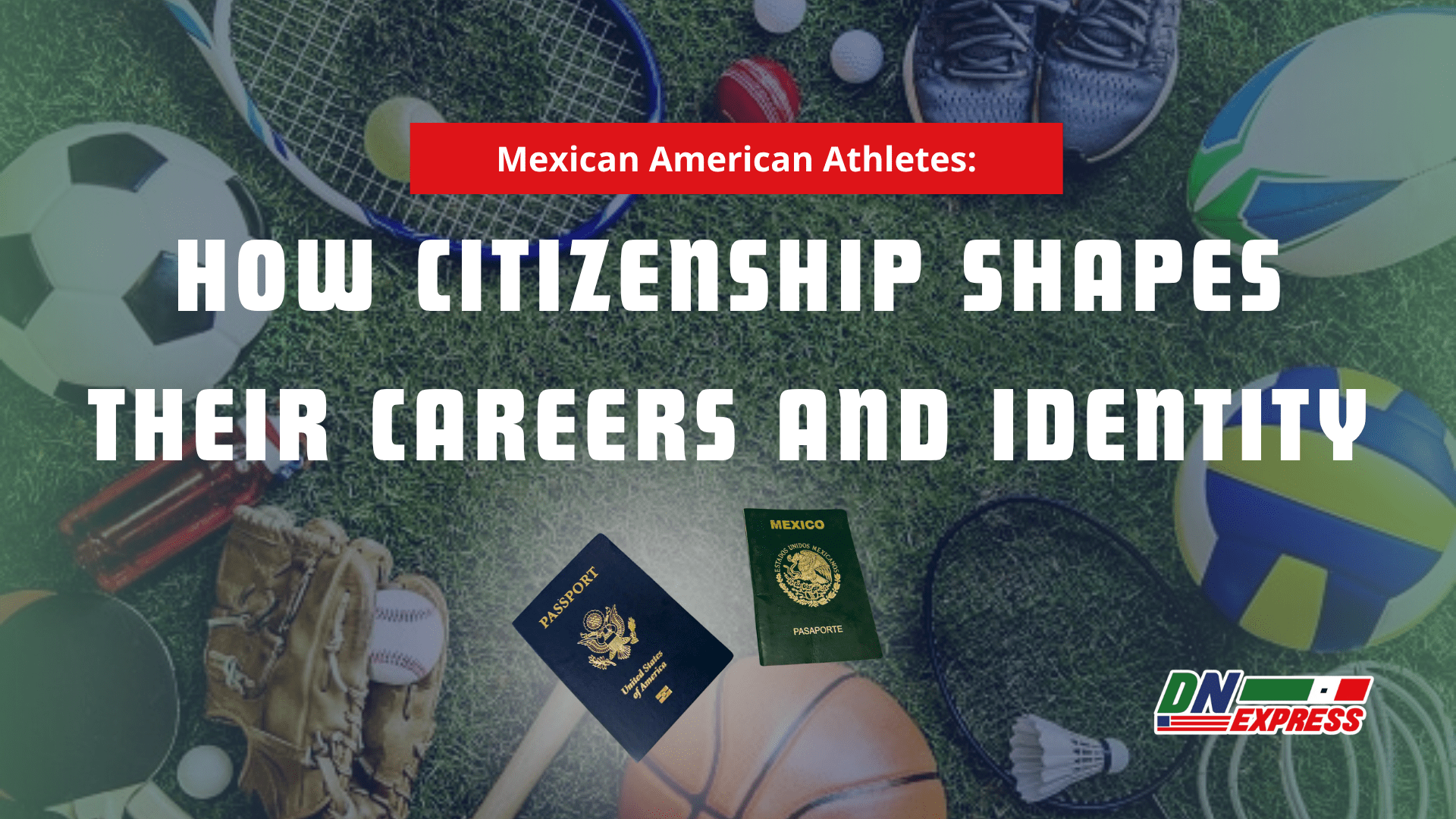From Canelo to college soccer hopefuls, Mexican American athletes are redefining representation in sports. This guide explores their challenges, dual nationality benefits, and how U.S.-born athletes are claiming Mexican citizenship to advance their careers.
Whether you're an athlete, parent, or lifelong fan, you'll discover how legal identity plays a surprising role in who gets to compete, and who gets left out. From professional boxing to NCAA recruiting, dual citizenship has powerful benefits.
At our firm, we help athletes, families, and professionals overcome the barriers that block their path to Mexican nationality, fast, legally, and without the consulate chaos. If you've ever been told it's too late or too complicated, we're here to prove otherwise.
Want to know which athletes made history, what's holding others back, and how to claim your place on both sides of the border? Keep reading, we've got you covered.
Defining “Mexican American” in the Sports World
A Mexican American athlete goes beyond being a sports figure with cultural ties.They're a living blend of two nations, carrying Mexican heritage while training, competing, and often being raised entirely in the United States.
They might be born in California or Texas, but their identity is shaped by abuelitas' stories and weekend soccer in the park as much as by high school football games and travel tournaments.
This dual heritage can be both a gift and a challenge. Athletes like Canelo Álvarez embrace Mexican pride on the global stage, while U.S.-born players such as Maria Sanchez or Julián Araujo often face a deeper question: Which country do I represent?
Sports Where They Excel:
- Boxing: A historic powerhouse sport for both Mexico and Mexican Americans.
- Soccer: Many are eligible for either Team USA or Team Mexico.
- Football: While representation is low, stars like Mark Sánchez and Tony Romo broke through.
- Baseball: Players like Alex Verdugo carry their heritage proudly onto the MLB field.
- Track & Field: Athletes like Enriqueta Basilio paved the way for women and Latinas globally.
But identity in sports goes beyond birthplace, it's about belonging. Mexican American athletes often face a kind of “prove it” pressure from both sides: not Mexican enough for one country, not mainstream enough for the other.
This tension has turned representation into cultural and political action.
Their stories aren't about medals. They're about access, recognition, and navigating two systems that don't always make space for both sides of who they are.
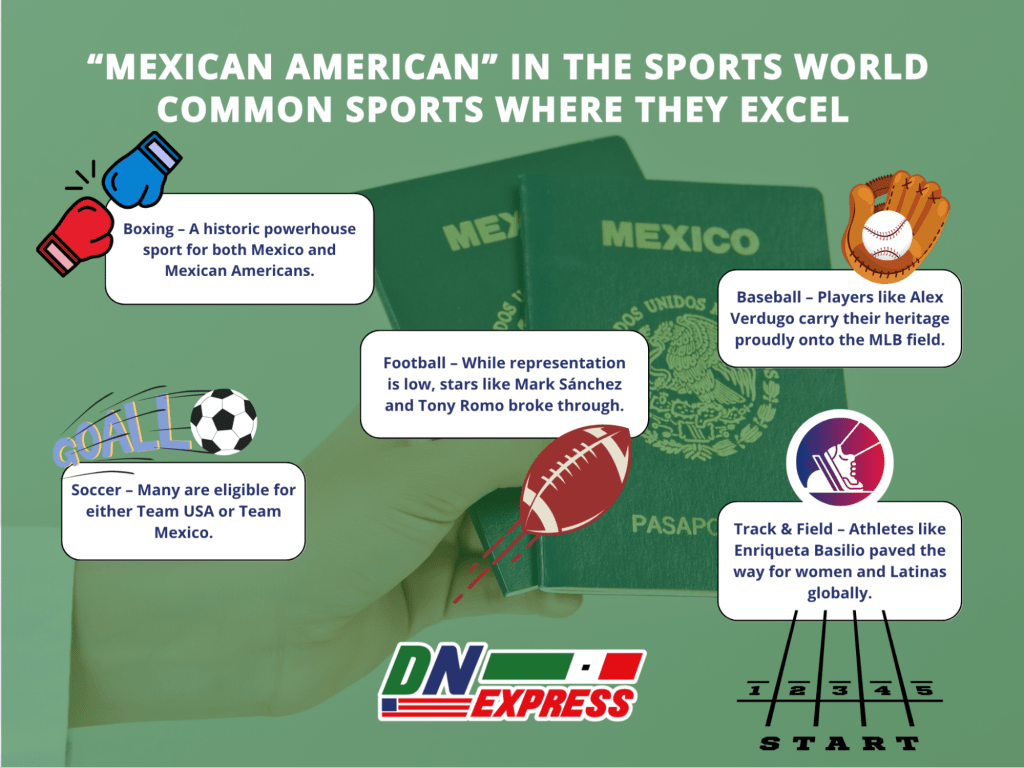
How Mexican Citizenship Impacts U.S.-Born Athletes
U.S.-Born Children of Mexican Parents
Many Mexican American athletes were born in the U.S. but never officially registered with the Mexican government. They grow up with a strong cultural connection, speaking Spanish at home, celebrating Mexican holidays, yet don't realize they're eligible for Mexican nationality until much later.
Often, these individuals come to us saying: “My parents never did the paperwork, but I want my rights now.”
Whether it's for college, travel, or reconnecting with family, this generation is realizing they can claim a nationality that was always theirs, without having to step foot in a consulate.
Adults Reclaiming Their Heritage
Many adults were told they missed their chance to claim Mexican nationality, usually by a misinformed official or outdated online advice. But eligibility doesn't expire. In fact, we've helped clients well into their 50s successfully obtain their Mexican documents and even apply for dual citizenship for their children.
As one client shared: “I'm 40 and thought I missed my chance. Turns out, I still qualify.”
This goes beyond passports. It's about finally being seen, legally and culturally, for who they've always been.
Athletes Wanting to Represent Mexico
For athletes, citizenship isn't personal, it's professional. Many U.S.-trained soccer players, boxers, and Olympic hopefuls want to compete for Mexico but are blocked by paperwork. We've seen players lose roster spots, miss trials, or delay their careers because the consulate denied their application or told them they needed to “prove” additional requirements.
One pro athlete told us: “I needed citizenship to play for Mexico, our firm made it happen.”
With the right legal guidance, gaining Mexican nationality can be done in time for key competitions, no consulate, no delays, and no lost seasons.
Parents Seeking Identity for Their Kids
Parents who grew up Mexican American now want something additional for their children: official nationality, legal access to Mexico, and a deeper connection to their roots.
We've seen a surge of applications from families wanting their kids to feel as Mexican as they are American.
A mother in California shared: “I want my kids to grow up knowing they're Mexican, too.”
It's about passing down culture alongside legal recognition that can impact their children's education, inheritance, and opportunities abroad.
Legal & Financial Advantage Seekers
Some clients come to us already living part-time in Mexico or looking to retire there. Others want to invest in property, secure a Mexican tax ID, or run a cross-border business legally. But without citizenship, the process becomes complicated, and expensive.
Their request usually sounds like this: “I already live in Mexico part-time, now I want to make it official.”
For these families, dual citizenship goes beyond sports or heritage, it's about freedom, access, and long-term planning. We help them get there, quickly, legally, and with proper document translation when needed.
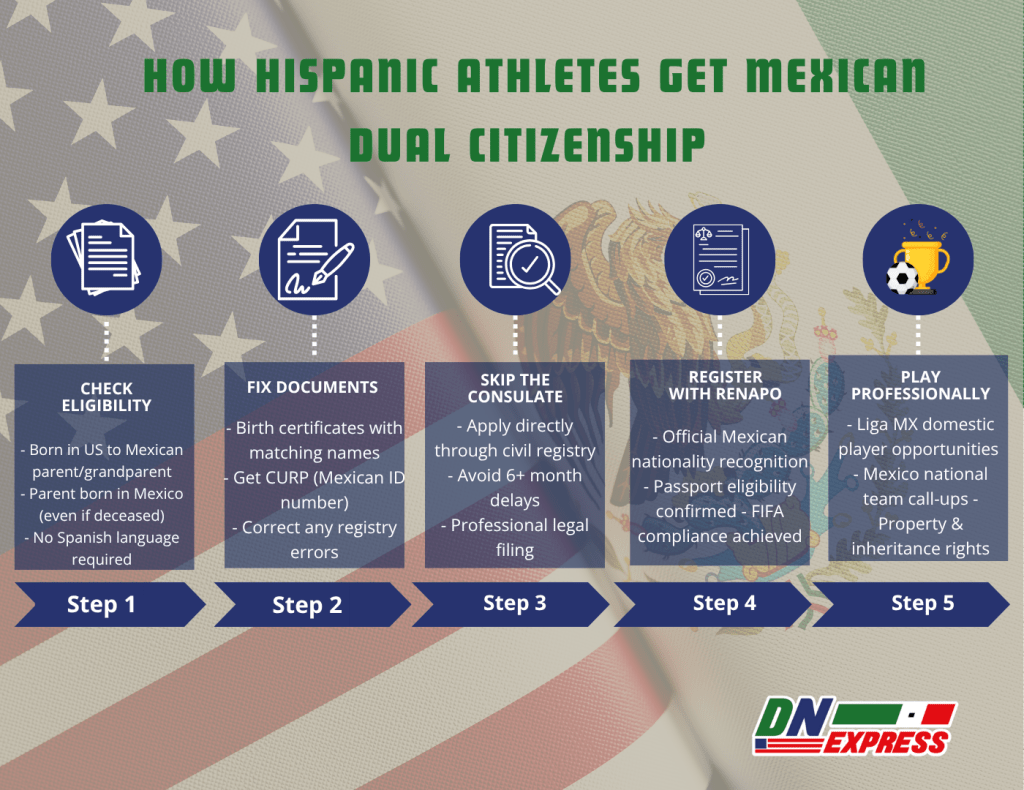
25 Mexican American Athletes Who've Changed the Game
1. 🥊 Canelo Álvarez
Boxing's biggest global icon and a symbol of Mexican pride. A multi-division world champion known for his discipline, charisma, and national loyalty.
2. ⚽ Chicharito Hernández
Star striker who played for Manchester United and LA Galaxy. His international goals and passionate play have made him a beloved figure for Team Mexico fans.
3. 🏈 Anthony Muñoz
Regarded as one of the greatest offensive linemen in NFL history. A Hall of Famer who proudly represents his Mexican roots.
4. 🏈 Mark Sánchez
First-generation quarterback who led the New York Jets to two AFC Championship games, opening doors for Latino athletes in the NFL.
5. ⚽ Maria Sanchez
Born in Idaho, she played for the U.S. youth team before switching to Mexico's national team. Now a standout in Liga MX Femenil.
6. 🥊 Oscar De La Hoya
A U.S.-born Olympic gold medalist and multiple-weight world boxing champion. He later founded Golden Boy Promotions, empowering Latino fighters globally.
7. 🏈 Jim Plunkett
First Latino quarterback to win a Super Bowl. His perseverance through adversity remains an inspiration to Mexican American football players nationwide.
8. ⚽ Julian Araujo
Raised in California, he switched from Team USA to play for Mexico. Currently playing in Spain, representing the next generation of dual-eligible talent.
9. 🏈 Tony Romo
Former Cowboys quarterback and now a top NFL broadcaster. Romo's precision and leadership made him a household name in Mexican American sports culture.
10. 🏀 Diana Taurasi
Basketball legend with Mexican heritage on her father's side. A five-time Olympic gold medalist who has helped redefine women's basketball globally.
11. 🥋 Ariel Torres
Cuban-Mexican karateka and Olympic bronze medalist. Known for his technique and humility, he's brought visibility to martial arts in Latino communities.
12. ⚾ Alex Verdugo
MLB outfielder who's embraced his Mexican heritage with pride. Frequently seen wearing Mexican flag gear, connecting with fans on both sides of the border.
13. 🤽♀️ Anita Alvarez
Artistic swimmer and three-time Olympian who overcame public health scares to represent Team USA and the Latina community in aquatic sports.
14. 🤸♀️ Hezly Rivera
Teenage gymnast of Mexican and Dominican descent. Represented the U.S. at the Paris Olympics and speaks openly about cultural pride and visibility.
15. ⚽ Melanie Barcenas
At 15, she became the youngest player in NWSL history. A rising star in soccer and a symbol of opportunity for young Latinas.
16. 🏀 Lou Lopez Sénéchal
First Mexican-born player drafted into the WNBA. With international roots across Mexico, France, and the U.S., she represents the future of global basketball.
17. 🦿 Beatriz Hatz
Para-athlete who earned a bronze medal in long jump at the Paralympics. Celebrates both her American and Mexican identities proudly in every performance.
18. 🤼♀️ Kennedy Blades
Olympic silver medalist in wrestling with Black, Mexican, and Honduran roots. Inspires young girls of color to see themselves on the world stage.
19. ⚾ Sergio Romo
Three-time World Series champion pitcher. Known for his clutch postseason performances and passionate advocacy for Latino communities in sports.
20. ⚽ Efraín Álvarez
LA Galaxy midfielder who chose to represent Mexico internationally. Known for his creative play and deep family roots in the Mexican soccer system.
21. 🏈 Tony Casillas
Two-time Super Bowl champion and one of the earliest Mexican American defensive stars in the NFL.
22. ⚾ Adrián González
Former MLB first baseman nicknamed “El Titán.” Represented Mexico in multiple international tournaments while leading in home runs and RBIs.
23. ⚾ Ramón Laureano
Oakland A's outfielder with Mexican and Dominican heritage. Known for speed, cannon throws, and high-energy outfield play.
24. 🏌️♂️ Abraham Ancer
Professional golfer born in Texas, raised in Reynosa. Represents Mexico on the PGA Tour and in the Olympics.
25. 🧗♀️ Natalie Duran
Elite rock climber and American Ninja Warrior contestant. Uses her platform to speak about identity, resilience, and being Latina in extreme sports.
These athletes don't wear the jersey, they carry two cultures into every game, match, or tournament. Their presence continues to shift the narrative, open doors, and inspire Mexican Americans across the country. Research shows their impact extends far beyond individual achievements.
Key Challenges Mexican American Athletes Face
For many Mexican American athletes, the road to success goes beyond talent, it's about overcoming barriers that others never face. From systemic inequalities in youth sports to legal mistakes at the consulate, these athletes often have to work twice as hard to be seen.
Financial Barriers in Youth Sports
Youth sports in the U.S. have increasingly adopted a “pay-to-play” model. Club teams, travel tournaments, and elite training can cost families thousands of dollars a year, pricing out many low-income Latino households.
While talent is evenly distributed, opportunity is not. As a result, promising Mexican American athletes are often left out of recruiting pipelines simply because they can't afford access.
“We had the skill, the money to get noticed was the issue.”
This economic wall disproportionately affects athletes in soccer, baseball, and volleyball, sports where scouts prioritize private leagues and elite camps. Studies document how financial barriers limit Latino participation in organized sports.
Gender Disparities
For young Latina athletes, the gap is even wider. While boys may be scouted through MLS academies or funded programs, girls' opportunities are often left to chance. Many families, shaped by traditional gender norms, don't encourage daughters to pursue competitive sports.
This cultural hesitation, combined with fewer development pipelines for girls, means that many talented female athletes go unseen.
But change is happening. Young stars like Melanie Barcenas are breaking through, showing that Mexican American girls can compete, and win, on the global stage.
Cultural Expectations & Identity Conflicts
“Why are you playing sports? Shouldn't you be studying or working?”
It's a question many first-generation athletes hear, especially from family members unfamiliar with the long-term value of athletics. Mexican American athletes often navigate cultural pressures that view sports as a distraction rather than a path to success.
At the same time, they struggle with dual identity questions:
“Am I American enough to make it here? Am I Mexican enough to be accepted there?”
This inner conflict can shape their decisions about which teams to play for, which flag to represent, and whether they feel fully welcome on either side of the border.
Missteps at the Consulate
Unfortunately, even when athletes are ready to represent Mexico, paperwork often stands in the way. We've seen athletes denied nationality due to minor birth certificate errors or incomplete registrations, errors often caused by misinformation or lack of legal guidance.
Some were told they were too old. Others were told their U.S. birth disqualified them. Neither is true.
We've helped dozens of athletes correct these errors, reclaim their nationality, and submit the documents they need to compete. We do it all remotely, no consulate visit required, and fast enough to meet tournament deadlines.
For these athletes, fixing a form goes beyond red tape, it's the difference between standing on the sidelines and stepping onto the world stage.
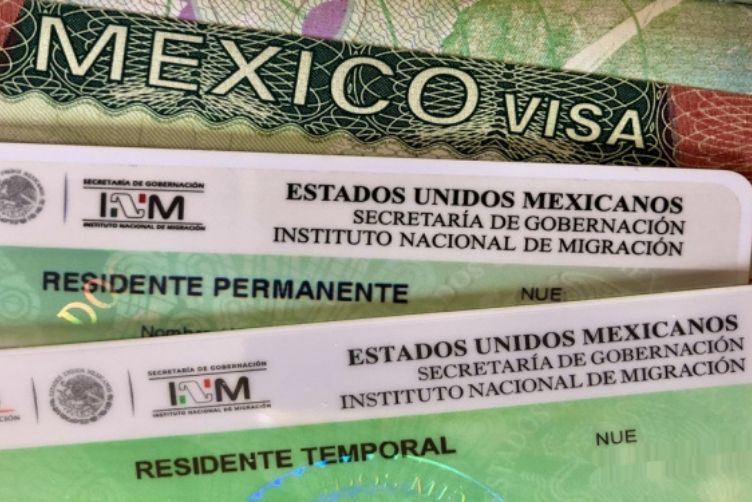
Why So Few? Concerns About Representation
Even with high-profile stars on the field, many Mexican American families are still left wondering: Why is there limited representation? Behind every underrepresented athlete is a structural reason, and a personal story. Here are some of the most frequent concerns we hear:
“Why are there so few Latino women in pro sports?”
Despite the rising talent pool, Latina athletes remain severely underrepresented at the pro level, and the reasons are layered:
- Lack of scouting: Recruiters often overlook Latino neighborhoods and public school leagues.
- Few development programs for girls: MLS and other institutions fund boys' academies, girls' programs are often underfunded or nonexistent.
- Cultural biases: Some families discourage girls from pursuing competitive athletics, prioritizing other “safer” paths.
Still, change is coming. Athletes like Melanie Barcenas and Maria Sanchez are proving that Latina athletes don't just belong, they excel. Research confirms these participation gaps affect Latino communities disproportionately.
“My son plays well, why didn't he get picked?”
We've worked with dozens of families who've asked this same question. The hard truth?
- Club over public: Scouts prioritize expensive club teams over school athletes, even when talent is equal.
- Money equals access: Travel teams, tournaments, and private training can cost thousands, out of reach for many Latino households.
Even when talent is there, the system doesn't always allow it to shine. It's about ability and access.
“I'm scared of being rejected by both countries”
Dual heritage should be a strength, not a source of fear. But many U.S.-born Mexican athletes feel caught in the middle:
- Backlash for switching teams: Choosing to play for Mexico over the U.S. (or vice versa) can invite criticism from both sides.
- Identity loyalty tests: Some athletes are pressured to “prove” their cultural allegiance, especially on social media.
As one athlete told us, “When I play for Mexico, people say I'm not Mexican enough. When I stay here, they say I abandoned my roots.”
We see this struggle often. That's why we believe citizenship is about affirming who you are, not choosing between countries. Studies show this identity conflict affects Latino athletes at the highest levels of competition.
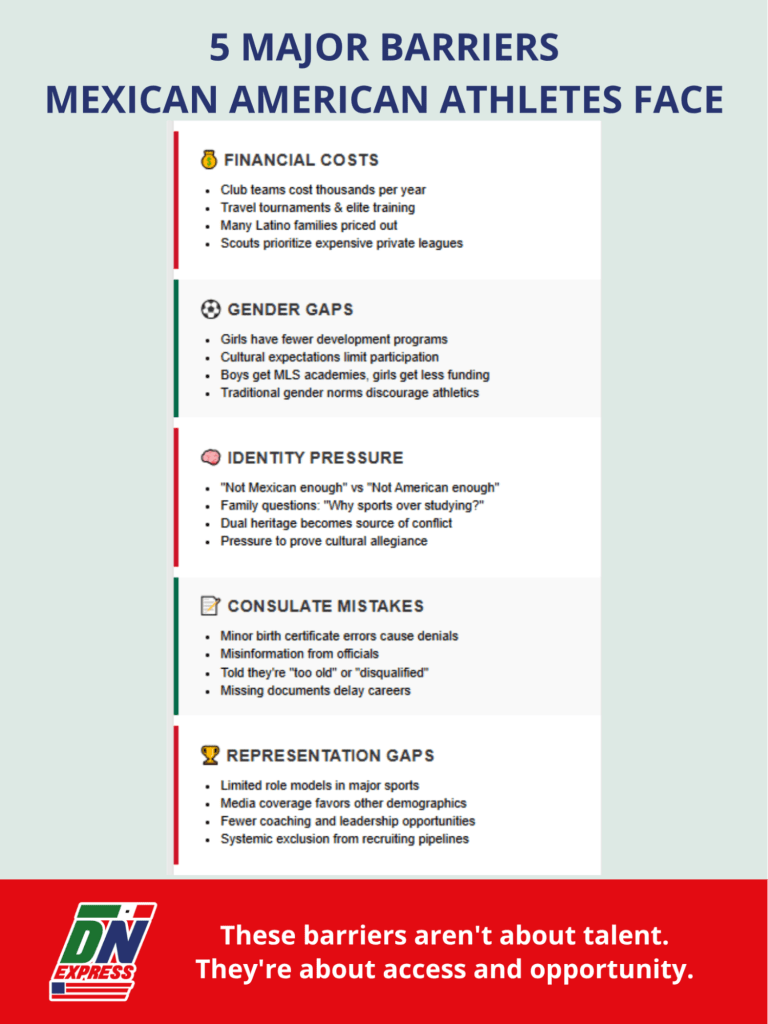
How We Help Athletes Claim Their Mexican Identity
Athletes don't have time to wait in lines, decipher legal jargon, or miss another shot at a team because of missing documents. That's where our firm comes in, with a faster, smarter, and more dignified way to secure your Mexican citizenship.
Why Athletes Trust Our Services
Whether you're a college hopeful or a seasoned pro, timing and accuracy matter. Our experienced team is built for both.
- Fast: We've helped athletes get dual citizenship approved in as little as six weeks, in time for camps, tournaments, and deadlines.
- Accurate: We catch and correct legal errors on birth certificates, CURP records, and apostilles that others miss entirely.
- Remote: No consulate visits. No appointments. We handle everything virtually, so you can focus on training, not bureaucracy.
- Proven: We've helped athletes who were flat-out rejected by consulates finally secure nationality and compete on the world stage.
- Family-Friendly: We don't help only the athlete. We help their siblings, parents, and kids navigate the process too, because citizenship is generational.
The Cost of Doing It Yourself
We've seen what happens when athletes try to handle this alone or through the consulate:
- Delays that cost you seasons. Missed paperwork means missed opportunities.
- Deadlines blown. Some athletes found out too late they were eligible to join the team.
- Paperwork confusion. Most families don't realize one typo or untranslated document can sink the whole process.
We take the risk off your plate, and turn complicated legal steps into a clear, supportive journey toward full recognition. You shouldn't lose your shot because the system is broken. Athletes often need their Mexican passport quickly for competitions.
Being Mexican American Means You Belong in Both Worlds
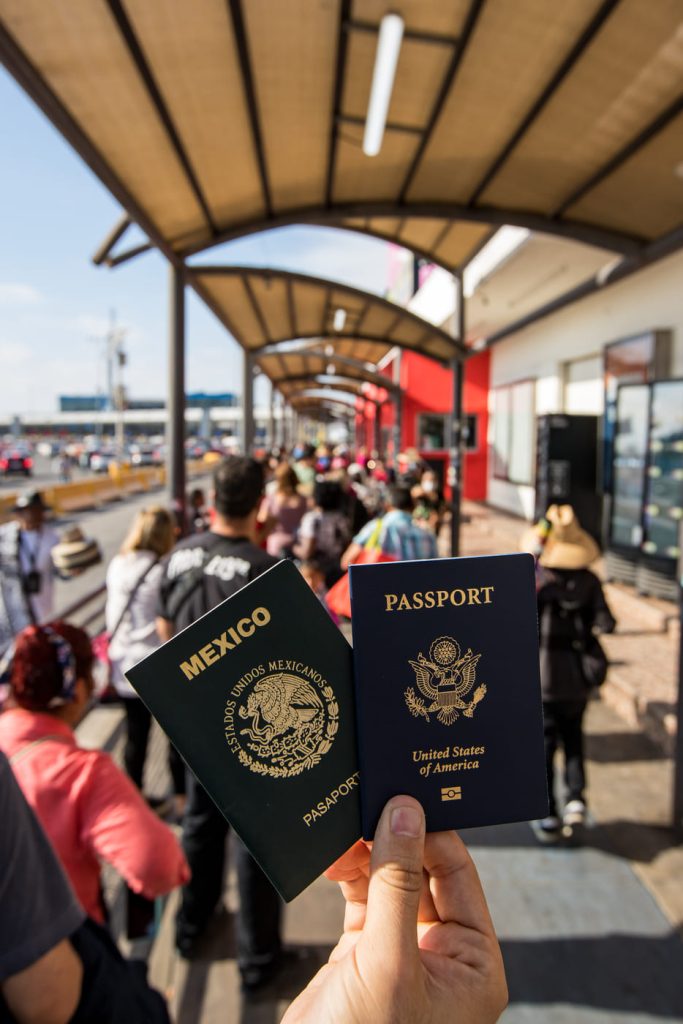
Whether you're fighting for a national title or raising a daughter who loves fútbol, claiming your full identity matters. Mexican American athletes don't need to choose one side of the border, they're proof that it's possible to live, compete, and succeed in both.
Our firm helps turn that belief into legal reality. For every athlete we've worked with, it's never been about the paperwork. It's about being seen, being eligible, and being empowered to compete without limitations.
If you're ready to take that step, for yourself, your children, or your career, we're here to guide you.
Schedule a Free Case Review o Message Us on WhatsApp
Learn more about our process and common questions.
Because your story deserves to be recognized, in both countries, on your terms.
FAQ About Mexican American Athletes (and Honest Answers)
We hear these questions often, from curious fans to families exploring dual citizenship for their kids. Here are the answers, backed by experience and context:
Who is Mexico's most famous athlete?
That title likely belongs to Canelo Álvarez, a global boxing superstar who proudly carries the Mexican flag into every arena. His discipline, dominance, and cultural pride have made him a living legend both in Mexico and among Mexican Americans.
Are there any Mexican Americans in the NFL?
Absolutely. High-profile players like Tony Romo, Mark Sánchez, and Hall of Famer Anthony Muñoz have blazed trails for Latino athletes in pro football. Still, representation remains low compared to other demographics.
Which Hispanic athletes play on U.S. teams?
Dozens, and the number is growing. Stars like Sofia Huerta and Maria Sanchez (who started with Team USA before switching to Mexico) reflect the fluid national ties many athletes navigate.
Who is a famous Hispanic or Latino athlete?
Besides Canelo, legends like Oscar De La Hoya and Jim Plunkett shaped entire generations. Today, younger athletes like Alex Verdugo (MLB) and Julian Araujo (soccer) carry that legacy forward. Hispanic sports fans are increasingly driving viewership across all major sports.
Are there any Mexicans in the NBA or WNBA?
Very few. Latino underrepresentation in basketball remains a major concern. However, athletes like Lou Lopez Sénéchal, recently drafted into the WNBA, are changing the narrative.
What NFL teams do Mexicans like?
The Dallas Cowboys and Las Vegas Raiders tend to have the strongest Mexican fan bases, due in part to regional proximity, media coverage, and cultural resonance.
How many Mexicans are in the NFL?
Fewer than 20 players currently identify as Mexican or Mexican American. While small in number, their impact continues to grow, especially as youth football becomes diverse across states like Texas, California, and Arizona. Comprehensive data shows Latino representation varies significantly across different sports.

